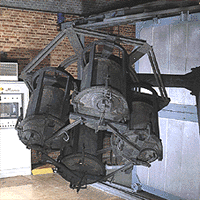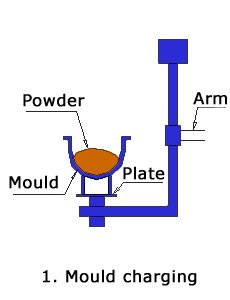Production Process: rotational moulding
 Rotational moulding is a method that is ideally suited for the production of relatively large, hollow, seamless products that are completely or partially closed.
Rotational moulding is a method that is ideally suited for the production of relatively large, hollow, seamless products that are completely or partially closed.
The rotational moulding process is suited for the production of small series as well as larger series, the main advantage being that the mould costs are very low. The materials most often used in rotational moulding are “POLYETHYLENE (PE)” and “POLYPROPYLENE (PP)”.
The concept of rotational moulding is fairly simple and consists of 4 steps .

- Mould charging:
A predetermined charge of cold plastic powder is placed in one half of a cold mould, which is then closed.
- Mould rotation and heating:
The arm with the mould is then inserted into the oven, where the plastic is warmed up to the right melting temperature.
The mould is rotated biaxially in this heated oven.
Thus, the plastic powder inside the mould starts to melt and coat the inside surface of the mould.
The rotation of the mould continues until all plastic powder has melted and is evenly divided inside the mould.
- Mould cooling:
As the biaxial rotation continues, the arm with the mould is transferred to a cooled environment. There, air, water or a combination of both is used to cool the mould and the molten plastic.
The cooling process continues until the plastic has solidified and the plastic product maintains its form.
- De-moulding of the final product:
After the cooling, the rotational arm is transferred to the load and unload station. The mould is opened and the product is de-moulded.
When the product is de-moulded, the mould can be charged again with powder and the process can start all over again.
|

 Rotational moulding is a method that is ideally suited for the production of relatively large, hollow, seamless products that are completely or partially closed.
Rotational moulding is a method that is ideally suited for the production of relatively large, hollow, seamless products that are completely or partially closed.